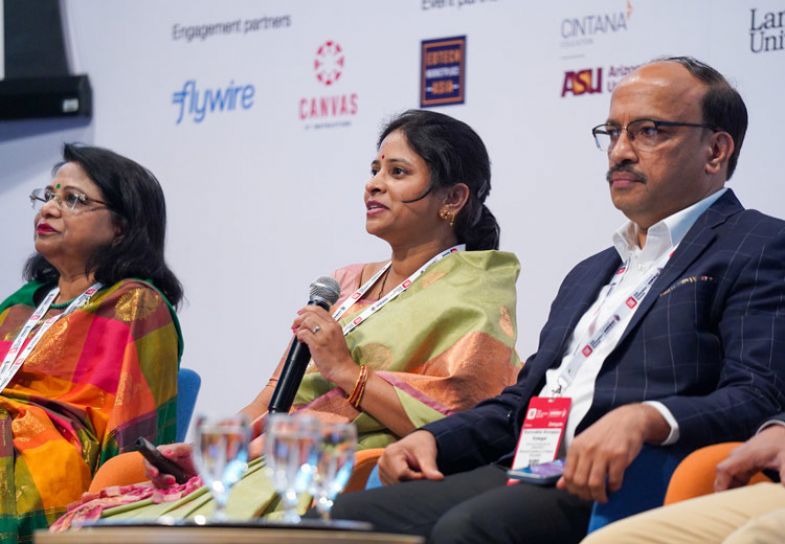
Institutions must keep track of industry trends and harness meaningful collaborations to create future-ready graduates
Universities are aware of the need to forge strong collaborations with stakeholders in the higher education sector. However, setting clear goals and implementing effectual strategies are key to maximising student success in the region. The Country Pavilions at the 2024 THE Asia Universities Summit showcased universities from across Asia – with day one focusing on India and the Philippines – highlighting their achievements, the importance of collaboration and how they align learning pathways with the United Nations’ Sustainable Development Goals (SDGs).
Madhu Chitkara, pro chancellor of Chitkara University in India, said universities can augment collaborations if they can make the most of each other’s strengths. “We have to discuss what verticals we can work on together,” she said. “We want international collaboration so that we can learn from each other and make it a part of our curricula and systems.”
Usually, stakeholders expect financial benefits from such collaborations, but the primary focus should be on creating societal impact, said Karunakar Annappa Kotegar, director of international collaboration at the Manipal Academy of Higher Education.
Anurag Satpathy, professor at Siksha ‘O’ Anusandhan in India, agreed, suggesting that universities must be clear about why they want to forge collaborations. “Once we have the focus right, we can add collaborators,” Satpathy said, sharing that the university’s Centre for Environment and Climate provides real-time lightning detection and weather forecasts in partnership with Earth Networks in the US and the India Meteorological Department.

Support from governments is crucial, said Nestor Ong, deputy director for QS and THE Rankings at the University of Santo Tomas in the Philippines. The university collaborates with the Climate Change Commission in the Philippines to align its contributions with the SDGs.
Learning opportunities such as internships stemming from partnerships broaden graduates’ experiential learning and build skills, said the panellists. S. N. Sridhara, vice-chancellor of the Hindustan Institute of Technology and Science, said that the university prides itself on having established the Korean Language and Culture Centre in collaboration with the King Sejong Institute (KSI) in South Korea. As the only KSI centre in India, it facilitates cultural awareness, knowledge transfer and student mobility between the two countries.
Strong partnerships empower students to work closely with industry and society, said Visalakshi Talakokula, assistant dean of academics and research and development at École Centrale School of Engineering and head of the Internal Quality Assurance Cell at the Mahindra University in India. “We can have mutual benefits and complement each other in areas of expertise,” she said.
The panel:
- Madhu Chitkara, pro chancellor, Chitkara University
- Karunakar Annappa Kotegar, director of international collaboration, Manipal Academy of Higher Education
- Bhavit Mehta, senior content manager, Times Higher Education (chair)
- Nestor Ong, deputy director for QS and THE Rankings, University of Santo Tomas
- Anurag Satpathy, professor, Siksha ‘O’ Anusandhan
- N. Sridhara, vice-chancellor, Hindustan Institute of Technology and Science
- Visalakshi Talakokula, assistant dean of academics and research and development at École Centrale School of Engineering and head of the Internal Quality Assurance Cell, Mahindra University
Find out more about the Country Pavilions at the 2024 THE Asia Universities Summit.

